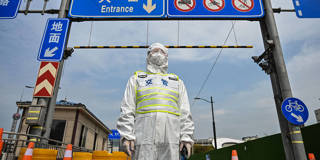China's full-scale lockdown of Shanghai, the country's largest urban economy, will have far-reaching economic and social costs. More than just a public-health measure, the move should be interpreted as a reassertion of centralized control and a partial reversal of the devolution of power that took root after 1978.
CHICAGO – After signaling that it was moving to a more nuanced COVID-19 policy, Shanghai – a city of 26 million – was pressured by the central government to lock down in late March, and has only just started to ease restrictions after almost one month. The official reason for this drastic policy shift is that citywide testing had revealed high infection rates. Yet one is left wondering why the authorities didn’t opt for a less costly alternative to a complete lockdown.

CHICAGO – After signaling that it was moving to a more nuanced COVID-19 policy, Shanghai – a city of 26 million – was pressured by the central government to lock down in late March, and has only just started to ease restrictions after almost one month. The official reason for this drastic policy shift is that citywide testing had revealed high infection rates. Yet one is left wondering why the authorities didn’t opt for a less costly alternative to a complete lockdown.